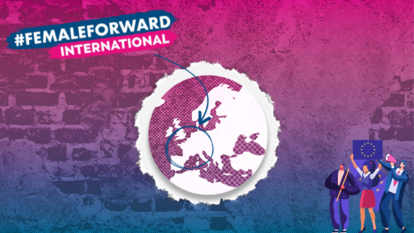Female Forward
Promoting gender equality in Italy – a long way to go

“Female empowerment” – a word which is very en vouge, describing a multidimensional social and economic process that helps people to develop their talent, gain control over their lives and take up opportunities. In Italy women have – compared to other Western countries- a particularly low presence in top positions and not even half of all Italian women are in the workforce. The Italian legislation is modern and well-intended to promote women, but the problem is deeply rooted and cultural: Invisible barriers hinder women from succeeding in their professions and taking top positions are widely spread. Sexism, misogyny and "machismo" are a problem and sometimes used as a weapon against female politicians. And yet too often feminism is misused for political campaigning. In a structurally conservative country where patterns of thought and behavior are still shaped by the strong influence of the Catholic Church. We talked about the situation and how to create a favorable environment for women in Italy with Marina Lili Venturini, President of the association Nazionale Donne Elettrici (ANDE), an NGO committed to promote active citizenship and political awareness and equal opportunities for women and men.
Let us start our conversation with political representation: In the Spanish parliament, 166 deputies are female, representing 47.4% of seats. This makes the Spanish parliament the EU leader in gender parity and the fifth in the world according to figures from UN Women. What about Italy?
In the Italian Parliament we have a very low female representation: Italy is in 39th global position. Belarus, Ethiopia Burundi do better than us. In the Italian Parliament we reach 36% and the Senate does even worse, only 32%. Gender equality is a big challenge in our country, and women struggle very much to reach leading positions. The glass ceiling is still far to be broken not only in Parliament, but in any leading context.
By law the Italian government tries to tackle the low representation of women in politics and economy. Also a certain quota in what political parties spent in events has to be spent for women empowerment. Gender quotas are highly disputed. How do you view such legal action to boost female representation?
Quotas in Italy are a must! I am not fond of introducing quotas for women empowerment, but it helps. It is a rule that has to be followed in public administrations or private boards and men have to get used to share leadership with women and get accustomed to work with them.

Not even half of all Italian women are in the workforce; yet their labor could boost economic performance, the central bank of Italy calculates. Women face higher unemployment rates, part time work and gender pay gaps. The “double burden”, to take up a job while delivering unpaid informal care and household work within families still falls heavily on women. In addition, Italy was among the countries most affected by the COVID-19 pandemic – confronting particularly women with the economic and social fallout?
During pandemic many women had to leave their job or lost it. Italy has been very much affected by the pandemic crisis and all the consequences. Many women are still without a job and maybe they do not look really for a new one. Incentives from the Government are not enough, and Italy has not enough adequate infrastructures to support women at work, like day care, kindergardens, schools, etc., especially in the South of the country. Work-life balance is a critical element of women’s empowerment and opportunities in terms of career growth, salary increase, and leadership positions. A gender-equal balance between work and family, and an equal distribution of care taking and household should be the goal, so that women are not obliged to pursue part-time, low-paid, and low-responsibility jobs.
The Italian Government has provided massive funds (PNRR-Piano Nazionale di Ripresa e Resilienza) licensed by the Next generation EU plan in order to reform public administration and welfare state, which should create a favorable environment for women to empower their working opportunities and access to jobs and equal salary for men and women. How far reaching those actions are, needs to be seen.
Female empowerment means: ”Never give up”, never surrender”

The presence of women in politics paves the way for today’s young girls as role models to believe that they can be anything they want to be and by this encourage a higher political and societal representation. Education is the key for critical thinking, self-determination and freedom. What can be done to encourage young girls to unleash their potential?
In Italy the lack of trust into politicians and state institutions is not an incentive for youth to access to a politic career. We have to build again an image of a correct, transparent policy in administration and rebuilt values. This needs a change of culture and education which starts in schools and not in TV.
It is high time that women step in leadership positions in all areas of life to bring change and balance on the decision-making table, improve democracy, diversify the discourse, innovate, address inequalities. Whatever conclusions we may draw as complicating factors may be at play and being a woman obviously does not automatically make you a better leader, but good leaders are both, willing to listen (to health experts and scientists) and also willing take well thought out steps and decisive action. What is your perception on female leadership?
Female leadership can be reached by changing the cultural approach what is leadership, which is power but also commitment, skills and meritocracy. All this can happen far from populism that entails backflips on women’s rights. There is no real functioning democracy without the equal participation of women in decision-making, politics and civic activism. We have to speak up for liberal values and democracy to ensure gender equality.
The last question is a personal one: What do you find important to say with regard to female empowerment?
In general, women tend to not vote for women! But if, we do not stand together we will not make it to generate change. Female empowerment means: ”Never give up”, never surrender”

